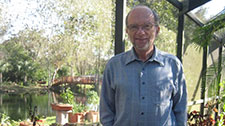News
June 4, 2014Using Science to Help the Extremely Poor

Dr. Martin Price, Founder and former director ECHO Program visited the Roberts Campus on Wednesday, March 26. Dr. Price spoke on issues of food scarcity and malnutrition in various areas of the world and how Christians can make a difference in improving the quality of life for poor subsistence farmers.
The lunch discussion in the Ellen Stowe room focused on Science, Research and the Poor. Dr. Price encourages those working to help the poor to “develop an experimental lifestyle.” This talk touched on the role pro-poor research/experimentation has at three levels: research programs in graduate schools, research at Christian colleges, and research/experimentation at non-profit organizations in Third World countries by those working directly with the poor (trained scientists, educated laymen and peasant farmers themselves).
The afternoon lecture to faculty and students, was titled, Using Science to Help the Extremely Poor. Imagine that you are about to head to a remote impoverished community somewhere in a tropical country to begin a three-year assignment, perhaps as a Peace Corps volunteer or as a missionary. The organization that recruited you is good at "big picture" community development skills, things like making small loans to start businesses, caring for orphans, education of the youth, organizing to fight corruption etc., but the bottom line is that the community remains impoverished because the farms are so unproductive and the environment is deteriorating. They would like you to identify specific problems and try to find potential low-cost solutions to at least a few of those problems. By the end of this talk the audience better understood some typical problems faced in such communities and were able to envision themselves actually helping to improve these communities.